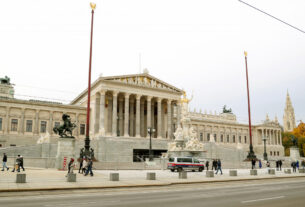No one performing onstage in Madrid’s Teatro Real opera house is masked, and that alone looks odd these days amid a pandemic.
And that’s even before the second act scene in Antonín Dvořák’s ‘Rusalka’ – about a water nymph who falls in love with a mortal – in which cast members kiss and grope in a feigned, non-socially distanced orgy.
While many of the world’s major venues are shut down, including the Metropolitan Opera in New York, Covent Garden in London and La Scala in Milan, watching a performance at the Teatro Real in the Spanish capital can almost make you forget about coronavirus.
Located in one of the cities hit hardest by the virus, the theatre is making a herculean effort for the show to go on, investing in safety measures that have allowed it to stage performances – albeit with smaller audiences – since July.
In March and April, soaring infections saw Madrid’s hospitals filled with COVID-19 patients. That eased in the summer, but another wave saw cases surge in the city and surrounding region. Authorities now seem to have gained the upper hand, with hospital occupancy rates falling steadily. Overall, Spain’s Health Ministry has recorded more than 1.54 million cases and has attributed almost 42,300 deaths to the virus.
“The theatre and culture must bet on staying open at all times,” Teatro Real managing director Ignacio García-Belenguer told The Associated Press. “It’s not about going against the flow or trying to be exceptional. … It’s what we believe we have to do”.
With a yearly budget of €60 million, Spain’s prime cultural centre acknowledges it has the capacity and ability to carry on.
García-Belenguer says its financing from public subsidies, sponsors and ticketing puts Teatro Real in a unique spot to break even, unlike other opera houses that are normally mostly public or private. Extra state funding because of the pandemic will help too, he adds.
But it also has the good fortune of being in a region that has decided to take a different tack with the virus and apply fewer and more-localized restrictions, allowing bars, restaurants and cultural venues to stay open with reduced attendance.
It was closed during Spain’s three months of national confinement between March and May, but preparations for reopening went on. It rolled out an array of measures that allowed it to stage a work with an audience, Giuseppe Verdi’s ‘La Traviata,’ in July. Since then, it has put on two other operas, ballets and flamenco shows, and plans a full season for 2021.
Everyone entering the theatre has their temperature taken automatically by machines. Hand sanitizers abound and surgical masks are supplied to all. There are ultra-violet lamps to disinfect the main theater, dressing rooms and clothing, and the air conditioning has been adapted to ensure a healthier air flow and temperature.
García-Belenguer says they will spend €1 million on safety measures by year’s end.
“I feel like I’m in a miracle,” says Lithuanian soprano Asmik Grigorian, the star of ‘Rusalka,’ which is a co-production with companies in Dresden, Bologna, Barcelona and Valencia. Those sites will not be able to stage the opera for some time.


















